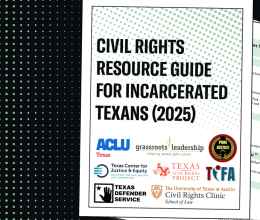
An Inhumane Milestone in Louisiana … Let’s Ensure Texas Does Not Follow Louisiana’s Lead
By Frank Knaack
Associate Director of Public Policy and Advocacy
Imagine being locked in a 9ft-by-6ft windowless room for 23 hours a day with only a toilet, mattress, sheets, blanket, pillow and small bench. Imagine this went on for 40 years (or 14,610 days) with no earthly end in sight. Imagine that during those 40 years your only contact with the outside world was limited to the infrequent visits and telephone calls, the opportunity to use a caged concrete yard three times a week, and letters (already opened and read by prison guards). Under what despotic regime could this occur? Stalin’s? Kim Jong-il’s? Nope, this occurred, and continues to occur in Louisiana.
As The Guardian reported yesterday, “[Herman] Wallace and his friend Albert Woodfox … mark[ed] one of the more unusual, and shameful, anniversaries in American penal history. Forty years ago to the day, they were put into solitary confinement in Louisiana's notorious Angola jail. They have been there ever since.” Mr. Wallace and Mr. Woodfox are better known as two of the Angola 3.
Regardless of their (or any inmate’s) actual guilt or innocence, the use of solitary confinement is inhumane treatment. While Texas may not have any inmates near the horrific milestone achieved in Louisiana, administrative segregation (what Texas calls solitary confinement) is commonplace in Texas state prisons.
Solitary confinement has a drastic and almost immediate negative impact on prisoners’ mental health – this does not benefit anyone. Human contact is essential for ensuring successful prisoner re-entry into society and reducing recidivism rates. Prisoners in administrative segregation are also denied access to church services and work programs. In the end, all Texans pay for the failure of solitary confinement.
Fortunately, there is something we can all do to stop this. The Texas Department of Criminal Justice is under its periodic review by the Sunset Commission. This review process provides us, the public, with an opportunity to let the Sunset Commission know that it is time for Texas to end this inhumane, counterproductive, and costly practice. Take action here!
Related Issues
Related content


ACLU of Texas Responds to State Officials’ Attacks on Nonprofits
November 19, 2025
Why Police Traffic Stops Are Dangerous and Ineffective
October 30, 2025
Advocating for Your Rights Behind Bars: How to Use Our Civil Rights...
August 15, 2025
Texas’ Money Bail System Is Unfair and Ineffective
July 18, 2025
What Is Due Process?
May 28, 2025
ACLU of Texas, Civil Rights Groups Send Letter to Texas Lawmakers...
May 23, 2025
ACLU of Texas Comments on Passage of S.B. 9 — Bail Bill That...
May 19, 2025